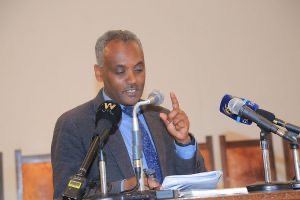Ethiopia Professor Launches New Book & Remembers His Peace Corps Teachers
Addis Ababa University Lifetime Professor launches a new book with great fanfare
Professor Bahru Zewde, Lifetime Professor and the board member of Addis Ababa University (AAU), has launched his new autobiographical book entitled, ‘Hibir Hiwote’, in collaboration with the Institute of Ethiopian Studies, Office of External Relations, Partnerships and Communications, Society of Friends of the Institute of Ethiopian Studies and History Department of AAU at the historic Ras Mekonnen Hall on July 6, 2023.
Shimelis Bonsa (PhD), an associate professor and researcher of African modern and contemporary history as an associate professor at Stony Brook University in New York, stated that Professor Bahru’s autobiography is the first autobiographical essay written by a pioneering Ethiopian historian in the field of autobiographical writings.
“According to my view and understanding, the key idea of the book is the great idea of unity, and it refers to his academic, social and political life, which is connected and cannot be seen separately. On the other hand, the central idea of the book, developed by various natural and man-made factors, shows the identity of the author, who is transboundary, human and local, Ethiopian as well as global,” he remarked.
Professor Shiferaw Bekele, Emeritus Professor of history at AAU, among the pages of the book, said that the author noticed Professor Bahr’s great leadership skills and his ability to bring people together, as well as his ability to cleverly combine the world of research and teaching with the world of administration.
He further said that the professor’s new book gives a clear picture of what the life of scholars is like in modern Ethiopia and also the story of the 1977 campaign, which the author named as the “Madness Campaign”, will be the main source for understanding the trials and abuses of universities.
“The professor’s first autobiography book makes a great contribution to understanding the life and struggles of historians and to properly understanding the challenges and pressures of the profession. In addition, the book helps us to understand the field of historical study or the science of writing historiography of the current Ethiopians.”
Ayele Zewde (PhD), the younger brother of Professor Bahru Zewde, said that the book is an ideal book that shows that hard work leads to great success by going through many hardships, trials and great patience, and that it highlights solidarity by putting aside individualism.
Professor Bahru Zewde, the author of his autobiography book, pointed out that writing an autobiography is both easy and difficult, and explained that he was astonished by his sports teacher’s deeds in his time in primary and secondary schools.
Prof. Bahru said how to cleverly overcome the challenges faced by his former sports teacher, allowed him to gain wisdom and contributed to his current success.
The Professor told the audience that among the Peace Corps teachers during his higher education time, his English and history teachers left a big mark on his personal life.
He noted that his former Peace Corps teachers helped him a great deal to learn how to express deep thoughts in short sentences and to acquire knowledge about research paper presentation and footnotes before entering a higher education institution.

Does he name any specific volunteers or state where he attended highschool? Who wrote this review? The Professor is quite accomplished to say the least
No names given or I could find.
I am reading the memoir and Bahru Zewde tells of how he became a historian mentioning the influence of his Peace Corps history teacher, Binder at Prince Makonnen School. (I assume that was Clifford Binder, a teacher in Addis Ababa from 1962-64, as my Google search confirms). Prior to entering his 11th year of education, Bahru says he was deeply interested in maths. But Binder breathed life into the subjects of the French Revolution and Napoleon for him, later inspiring Bahru with the notion that it could be a path worth pursuing. Bahru also acknowledges his English teacher, whom he simply calls Grange ( I’ve gathered his full name was Thomas A. Grange). Bahru attests that Grange played a crucial role in improving his English writing skills by providing rigorous corrections and guidance.